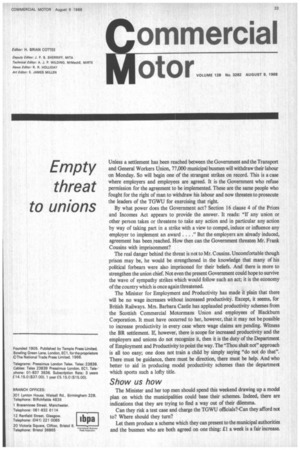Empty threat to unions
Page 35

If you've noticed an error in this article please click here to report it so we can fix it.
Unless a settlement has been reached between the Government and the Transport and General Workers Union, 77,000 municipal busmen will withdraw their labour on Monday. So will begin one of the strangest strikes on record. This is a case where employers and employees are agreed. It is the Government who refuse permission for the agreement to be implemented. These are the same people who fought for the right of man to withdraw his labour and now threaten to prosecute the leaders of the TGWU for exercising that right.
By what power does the Government act? Section 16 clause 4 of the Prices and Incomes Act appears to provide the answer. It reads: "If any union or other person takes or threatens to take any action and in particular any action by way of taking part in a strike with a view to compel, induce or influence any employer to implement an award. . . ." But the employers are already induced, agreement has been reached. How then can the Government threaten Mr. Frank Cousins with imprisonment?
The real danger behind the threat is not to Mr. Cousins. Uncomfortable though prison may be, he would be strengthened in the knowledge that many of his political forbears were also imprisoned for their beliefs. And there is more to strengthen the union chief. Not even the present Government could hope to survive the wave of sympathy strikes which would follow such an act; it is the economy of the country which is once again threatened.
The Minister for Employment and Productivity has made it plain that there will be no wage increases without increased productivity. Except, it seems, for British Railways. Mrs. Barbara Castle has applauded productivity schemes from the Scottish Commercial Motormans Union and employees of Blackburn Corporation. It must have occurred to her, however, that it may not be possible to increase productivity in every case where wage claims are pending. Witness the BR settlement. If, however, there is scope for increased productivity and the employers and unions do not recognize it, then it is the duty of the Department of Employment and Productivity to point the way. The "Thou shalt not" approach is all too easy; one does not train a child by simply saying "do not do that". There must be guidance, there must be direction, there must be help. And who better to aid in producing model productivity schemes than the department which sports such a lofty title.
Show us how
The Minister and her top men should spend this weekend drawing up a model plan on which the municipalities could base their schemes. Indeed, there are indications that they are trying to find a way out of their dilemma.
Can they risk a test case and charge the TGWU officials?•Can they afford not to? Where should they turn?
Let them produce a scheme which they can present to the municipal authorities and the busmen who are both agreed on one thing: £.1 a week is a fair increase.
















































































































































